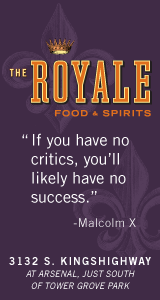By Antonio D. French
Filed Sunday, April 15, 2007 at 11:54 PM
There is a rumor that Riverview Gardens has been notified that the state is about to step in. Last week we asked Gov. Matt Blunt if state involvement in troubled districts was going to end with St. Louis Public Schools. Labels: Governor, Interviews, Schools, Video_Reports
UPDATE: Today DESE released the agenda for the State Board of Education's April meeting. It specifically noted that neither the St. Louis City schools nor the Riverview Gardens School Districts will be discussed this month.










9 Comments:
compare their district to SLPS and Wellston
4/16/2007 10:38 AM
not much in it for him.
It is not how bad off the school system is---it is how much can be harvested with a takeover.
4/16/2007 11:54 AM
we know that, but it is also how vulnerable a district is
4/16/2007 12:03 PM
Maybe these douchebags should make sure the district does not fail, thus fund it properly beforehand!
4/16/2007 9:59 PM
NCLB was designed to create a cascade of school districts falling into the hands of private companies which will receive federal money to run charter schools. Each year the AYP rises, more districts will fall. Perhaps when large suburban districts like Hazelwood begin to be devoured (and Hazelwood is very close) middle class America will wake up.
NCLB has allowed a handful of testing companies like McGraw Hill, which publishes the MAP test, to DEFINE what children should be taught, and how they should display that knowledge. The MAP test and other NCLB state assessments are the determining factors in assessing "how a school is performing", irrespective of adherence to established state curriculum. It is the narrowest form of education ever in American history.
Any school district that wishes to survive MUST teach the test and ONLY the test in order to avoid falling below the "required" AYP. This practice will only increase as AYP is raised every year to the 100% target in 2014. Unchecked, this will mean 100% of schools will have their curriculum defined by testing companies by 2014.
While everyone is focused on whether the state or the school boards will "control" the school districts, the FEDERAL GOVERNMENT has quietly allowed PRIVATE COMPANIES to be the real power controlling ALL public schools. Charter schools also fall under this control since if they continuously fail AYP they can be closed (as in Chicago).
No one has more say about your Missouri child's education today than McGraw Hill.
For more information, read my post on stlschools.org/forum dated March 9.
4/17/2007 7:42 AM
Good legal strategy on the part of the state. I do not know who the lawyers are for slps----but it seems they must weigh the possibility that a formal appeal to the state board will be stalled until the takeover is completed, or they can go directly to court with a case weakened by slps not having followed the appeals procedure.
But I am not a lawyer or a reporter---so I don't know and I can't ask.
4/17/2007 3:57 PM
Ariel writes:
> NCLB has allowed a handful of
> testing companies like McGraw
> Hill, which publishes the MAP
> test, to DEFINE what children
> should be taught, and how they
> should display that knowledge.
This is much too strong. Especially at the higher score-levels, the MAP tests assess readiness for higher education. But this is what McGraw-Hill are being asked to measure, isn't it? Because "tracking" is illegal (mostly) the political presumption is that success in High School means preparation for college. I note that McGraw-Hill did not cause or determine this, but they do measure it.
But preparation for college is mostly about literacy, and I notice you have not argued that literacy is bad or is at least unpredictive of success in life. What shall we universally measure about an educational process if not the outcome "mere literacy"?
For the curious, here are some sample tests items.
> The MAP test and other NCLB
> state assessments are the
> determining factors in
> assessing "how a school is
> performing"
Yes, the definition of "performing" being getting kids ready for college.
So: how do you define performing and how could I as the CEO of an educational services delivery organization measure that performance?
This ties in with Doug's comment: what does it mean for a student, teacher, school, or school district to fail, or for that matter, to succeed? Are there measurements we can make besides the number of dollars spent, or is it like porn: we know it when we see it?
Me? I want to do away with the notion of "Grade Level" and focus on skills and knowledge. Assessments of the delivery system would measure skills and knowledge vs. years in the system, with a risk adjustment against specific outcome goals. But this is a pretty radical idea that has to bring back the notion of tracking — not everybody's going to college. Some will go to work in trades, some in low-skill jobs, some in high-skill jobs, others will marry and look after a family, some will join the military, some will go to college. Someone will have to make a judgement somewhere along the line where a kid is most likely to succeed, and this is problematic for anyone who tries.
t
4/19/2007 1:16 AM
TL said: “…the MAP tests assess readiness for higher education. But this is what McGraw-Hill are being asked to measure, isn't it?”
NO. EMPHATICALLY NO.
The link you have posted is NOT to the MAP test to which I refer. The MAP in question here is the MISSOURI ASSESSMENT PROGRAM, published by McGraw Hill, not the instrument in your link, “Measures of Academic Progress”, which is a product of a non-profit organization called NWEA, Northwest Evaluation Association. The Missouri Assessment Program (MAP) is the test which Missouri schools are currently taking, which is referred to on the DESE site, and which is used for NCLB purposes.
The MISSOURI ASSESSMENT PROGRAM (MAP) tests are given SOLELY to determine whether a school meets AYP for purposes of NCLB.
They are given to children starting in 3rd grade, but not in every grade, and not in every subject. The same children do not take the test from year to year in a given subject, so there is no way to assess a child’s INDIVIDUAL progress in any given subject area. The focus of the MAP is on the performance of the SCHOOL from year to year. Different groups of children are compared to each other; this year’s third graders vs. last year’s third graders, for example.
Individual children’s scores are generally not even received until well into the following school year, and are usually not distributed to the teachers who taught the tested children--who have now moved on. Hence teachers cannot use them to asses the effectiveness of their instruction. The students'new teachers do not get the test scores until more than halfway through the school year, so they are of no help in planning instruction to address any individual child’s weaknesses before the child will shortly be tested again, or the child may be in a grade that will not be tested again for several years in that subject.
The MAP test has NO alignment to Missouri State Curriculum. Even though the Missouri Curriculum may require certain fields of study be taught, they may not be tested on the MAP. (Social Studies, for instance). Items on the test in a given field of study may not relate to the state mandated curriculum at all, and so may have NOT BEEN TAUGHT.
Also, please do not miss the point that not only is McGraw Hill in charge of what IS tested, they are also benefiting richly as “approved” providers for Reading First curriculum and consultants from the federal government. Reading First money comes into play when schools FAIL the MAP test. Convenient, huh?
4/19/2007 4:46 PM
OK, is this it?
It looks to me like its testing literacy in a more robust way than the NWEA test that I had mistaken for the Missouri test. Where the NWEA test looks something like the ACT or the Iowa Basic Skills things I took a few times in grade school, the MAP test does not use a multiple choice proxy for a reasoning process*. The downside is the MAP test has to be scored by hand by a well-trained person.
t
*Funny (to me at least) story. I worked in a remedial math lab when I got out of high school, and one of my duties was to create tests. The form of the test was dictated: cover problems of certain types, and use multiple choice answers. I wrote a set of tests for Intermediate Algebra. Since I had been grading and tutoring these for awhile, I knew what mistakes students made. So what I did was to figure out what answer you'd get for each kind of common mistake on that problem, and make it a "choice". For example, if you think that (a + b)_squared = a_squared + b_squared, I would have calculated a numerical result on that assumption, and you'd find that particular wrong answer as one of your choices. Since "None of the Above" was always a choice, sometimes the right answer does not appear at all, but a couple of common wrong ones do. I did one test where every correct answer was "b". You would not believe how many people would change correct answers because they could not believe that every correct answer was "b". Then they would find a wrong answer based on a common mistake... Some people thought all this was horribly unfair because it made it very difficult to guess your way through the exam. The lab director loved it.
4/20/2007 12:46 AM
Post a Comment
<< Home